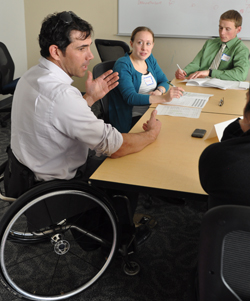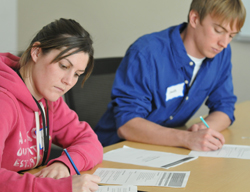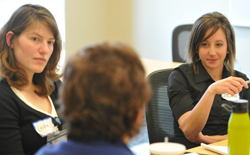Health Mentors
Interprofessional Education, School of Medicine
Editor’s note: The Health Mentor Program was discontinued in 2013 and is no longer available.
 (May 2, 2011) - The list of questions for the health mentors was long and covered a wide range of topics aside from the usual medical inquiries. From the mundane: Do you have a car?
(May 2, 2011) - The list of questions for the health mentors was long and covered a wide range of topics aside from the usual medical inquiries. From the mundane: Do you have a car?
To the
To the spiritual: What is the role of religion in your health?
Through it all, a picture was developing for the health sciences students of a person, of a patient, of a health mentor, who has volunteered to guide students through a two-year process to teach them the art of patient-centered health care. The process is intended to help students see the person behind the ailment: What are your passions? How would you change your life? What obstacles do you encounter in your health care? What have you had to give up because of your illness?
The REACH Health Mentor Program at Anschutz Medical Campus is in the pilot stage this spring with 14 mentors and 100 students and is an important part of the interprofessional education effort on campus. By fall, the program, coordinated by REACH which is integrating interprofessional education throughout the campus, will be in full swing. It will encompass 100 mentors and 600 first-year students from all schools and colleges on campus including medicine, nursing, physical therapy, physician assistant, dentistry and pharmacy.
Mentors, all of whom have chronic illnesses or disabilities, agree to share their health histories,
“Health care is really about the patient, not just about the disease,” program coordinator David Weil told the health mentors in the kickoff meeting this spring. “So tell us when you’ve had good experiences, and when you’ve had bad ones too.”
 Students recognize that health care is evolving and that they will be expected to adapt; that’s why medical student Chris Haas volunteered to participate in the pilot phase of the project.
Students recognize that health care is evolving and that they will be expected to adapt; that’s why medical student Chris Haas volunteered to participate in the pilot phase of the project.
“It’s important to me to collaborate with other fields,” Haas says. “In the
Many mentors volunteer because they like the idea of shaping the next generation, Weil says.
“They have had some bad health-care experiences," he said. “By sharing that feeling (with the students) and how that makes them feel, they start to think that they’re fixing that problem. And not just for themselves.”
Nick Peterson, who has had Parkinson’s disease for 36 years, previously volunteered with a similar program within the Physical Therapy Department.
“The thing I like best is the students will come to a certain conclusion, then the instructor will say ‘Have you thought about it this way?’ And you can see the light bulb go on. I feel great that I can help them learn.”
Medical student Geoffrey Fauchet read up on health care issues before he entered medical school and says his future profession values interprofessional education.
“I think it’s a great idea. For example, I don’t know what pharmacists do or how long they study – or nurses or PTs. We get to intimately work with them,” he says.
 While Peterson sees his role as one of helping students learn to be better health care professionals, Haas says his teams
While Peterson sees his role as one of helping students learn to be better health care professionals, Haas says his teams
“I think we see ourselves right now as being the medical home for Nick,” Haas says. “We are trying to work collaboratively with Nick to define some goals. If we can make something happen there and help him, and I see something coming out of this that we all did together, I think it would stick.”
Peterson says the students have already been a big help in helping him see his life more clearly. For many years he was a professional speaker who specialized in doing character voices. The ravages of Parkinson’s have made that impossible.
“It’s been hard on me to lose that. One of the things I was talking with them about was not feeling passion for anything anymore. One nursing student told me ‘As far as I’m concerned, your passion is right here.’”